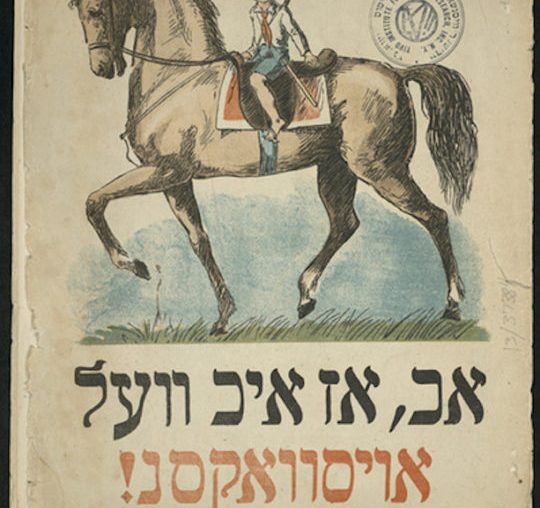Her eyes light up with joy as I begin to sing, arum dem fayer (around the campfire). She squeals with delight as I begin to read the classic Dr Seuss book, ayn fish, tsvey fish (One Fish, Two Fish).
Yiddish already plays a central role in my daughter’s life. For the past twelve weeks of my life and the first twelve weeks of hers, I have been combing over books, CDs, looking up song lyrics and calling my mother, all trying to help me remember the songs and stories of my childhood.
Already, only twelve weeks in, the questions have already begun.Why Yiddish? Why are you wasting your time (a real question I was asked just two weeks ago)? Don’t you think it will affect her English?
In an attempt not to have to repeatedly answer these questions again (though I’m sure this may well be futile), I have compiled my answers here to these questions. They reflect my personal responses and in no way should be taken to represent anyone other than myself (even my husbands answers are different than my own).
So, to begin with, why Yiddish? Well, why not Yiddish? Simply put, this question does not get asked to other second language speakers. No one is asking Israelis why they speak to their children in Hebrew. No one bats an eye at people hiring French or Spanish speaking nannies to hopefully impart these languages onto their children.
In my personal case, Yiddish was the language I was raised in. My childhood was filled with beautiful Yiddish songs, stories and poems. I remember my mother and both my bubba’s singing me these songs. I remember proudly singing Yiddish Peysakh songs at our family seders to rounds of applause. Even as a teenager, my initial response to speaking to babies and small children involved Yiddish. I taught my cousin’s children all sorts of Yiddish songs, words and phrases. So when it came to deciding the kind of environment I wanted to raise my own daughter in, for me, it wasn’t a hard decision. It was the only way I pictured life with my own children. My Yiddish is tied to my Jewish identity. It is the way I express myself and connect to my heritage.
Clearly, the reasons I have outlined above have nothing to do with the number of Yiddish speakers today, secular or not. It reflects my own experience and my own personal Jewish connection. I am not living in a world of denial. I am simply passing on to my daughter what I inherited from my parents.
Finally, perhaps the silliest question of all of them. Do I think raising her speaking Yiddish will affect her English? No. As someone who was raised bilingually, I can tell you that in the battle between Yiddish and English, I feel certain of the fact that all her friends, teachers, relatives, TV personalities and most books she will have access to will all be in English and will mean that her Yiddish will not adversely affect her English. There may be some instances where her grammatical structures or words get confused, but who shouldn’t want to hear from such a child?
In addition the research of the benefits of bilingualism is immense. First and foremost, for me, the benefit is in the increased empathy that bilingual children display. They learn from an early age to switch languages, depending of who they are talking to, they are able to identify the needs of others. I can think of nothing more important than passing on the importance of empathy, particularly in the world we live in today.
So there you have it. In simple terms, my answers to why Yiddish. Because it is my lucky choice to. Because I can and because I want to. Because it suits my family. Because we are Jews. Because our Jewish languages choices does not affect anyone other than ourselves. And finally, because we are proud of our Yiddish language. It is the most important gift we can give our daughter and I hope she will always smile at the sounds of Yiddish songs.


Comments are closed.